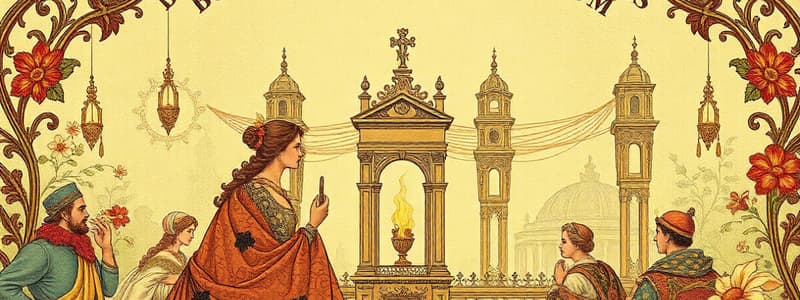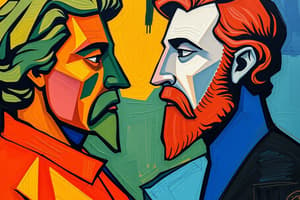Podcast
Questions and Answers
Which of the following is a critique of liberalism's emphasis on individualism?
Which of the following is a critique of liberalism's emphasis on individualism?
- It can promote a more just and equitable society.
- It strengthens the power of the state and limits personal freedom.
- It can lead to a lack of social cohesion and neglect of collective needs. (correct)
- It is inherently incompatible with democratic principles.
What is a common concern about the potential abuse of individual rights?
What is a common concern about the potential abuse of individual rights?
- It can undermine the principles of freedom and equality.
- It can hinder the effectiveness of government intervention in societal issues.
- It can result in the neglect of social responsibilities and community needs. (correct)
- It can lead to the erosion of individual rights.
Which of the following is NOT a key issue raised by critics of liberalism?
Which of the following is NOT a key issue raised by critics of liberalism?
- Liberalism may not be effective in addressing all societal problems.
- Liberalism can contribute to social fragmentation.
- Liberalism can foster a sense of community and shared responsibility. (correct)
- Liberalism can lead to a focus on individual rights at the expense of collective needs.
Which of the following best reflects the role of liberalism in modern politics?
Which of the following best reflects the role of liberalism in modern politics?
Which of these statements accurately reflects the ongoing debates regarding liberalism?
Which of these statements accurately reflects the ongoing debates regarding liberalism?
What is the central idea behind the concept of 'individualism' in liberalism?
What is the central idea behind the concept of 'individualism' in liberalism?
Which of the following best describes the key difference between classical liberalism and modern liberalism?
Which of the following best describes the key difference between classical liberalism and modern liberalism?
What is the core belief regarding government power in liberalism?
What is the core belief regarding government power in liberalism?
Which of the following is NOT a characteristic of liberalism?
Which of the following is NOT a characteristic of liberalism?
What is the philosophical foundation of liberalism?
What is the philosophical foundation of liberalism?
Which of the following is an example of a historical figure who contributed to liberal thought?
Which of the following is an example of a historical figure who contributed to liberal thought?
What is the main concern of libertarians regarding government intervention?
What is the main concern of libertarians regarding government intervention?
What is a common criticism of classical liberalism?
What is a common criticism of classical liberalism?
Flashcards
Balancing individual liberties with social responsibilities
Balancing individual liberties with social responsibilities
The delicate act of finding a point where individual rights meet the needs of society, creating a balance between personal freedom and common good.
Potential abuse of individual rights
Potential abuse of individual rights
Concerns about the potential misuse of individual freedoms, highlighting a lack of safeguards to stop abuses.
Liberalism
Liberalism
A political philosophy emphasizing individual rights, freedom, and limited government intervention.
Individualism over community
Individualism over community
Signup and view all the flashcards
Ineffectiveness of liberalism in certain contexts
Ineffectiveness of liberalism in certain contexts
Signup and view all the flashcards
Individualism
Individualism
Signup and view all the flashcards
Liberty
Liberty
Signup and view all the flashcards
Equality
Equality
Signup and view all the flashcards
Limited Government
Limited Government
Signup and view all the flashcards
Classical Liberalism
Classical Liberalism
Signup and view all the flashcards
Modern Liberalism
Modern Liberalism
Signup and view all the flashcards
Libertarianism
Libertarianism
Signup and view all the flashcards
Study Notes
Defining Liberalism
- Liberalism is a diverse political philosophy emphasizing individual rights, freedoms, and limited government.
- It champions individual liberty and autonomy.
- It advocates for a society based on reason, tolerance, and individual responsibility.
- Key tenets include: individual rights, limited government, and free markets.
- Historically it represented a break from traditional authority structures.
Core Principles of Liberalism
- Individualism: Prioritizes the individual's rights and freedoms above the collective good. Emphasizes self-reliance and personal responsibility.
- Liberty: Values freedom of thought, speech, religion, and association. Often includes freedom from arbitrary state intervention in personal affairs.
- Equality: Promotes equality before the law and equal opportunities. While often interpreted as equality of outcome, classical liberalism focuses more on equality of opportunity.
- Limited Government: Advocates for government constrained in its power and scope; power needs to be divided to prevent abuse. Supports checks and balances in government.
- Rationality, Tolerance, & Consent: Believes people are capable of reason and should be tolerant of different viewpoints. Promotes the idea that government should be based on the consent of the governed.
Types of Liberalism
- Classical Liberalism: Emerged in the 18th and 19th centuries, emphasizing individual freedoms, limited government intervention in the economy, and minimal social safety nets.
- Modern Liberalism: Developed in the 20th century, accepting a larger role for government in addressing social and economic inequality through social welfare programs, regulations, and progressive taxation. More supportive of social responsibility and collective action.
- Libertarianism: A more extreme form of classical liberalism emphasizing maximum individual freedom and minimal government intervention in all aspects of life, including the economy and social issues.
Historical Context
- Liberalism's roots lie in the Enlightenment's emphasis on reason and individual rights.
- Developed in opposition to absolute monarchy and hierarchical social structures.
- Key historical figures include John Locke, John Stuart Mill, and John Locke. Each contributed significantly to liberal thought.
Challenges to Liberalism
- Economic inequality: Critics argue that classical liberalism can exacerbate economic inequalities.
- Balancing individual liberties with social responsibilities: Finding a balance between individual rights and the needs of society can be challenging.
- Potential for abuse of individual rights: Critics raise concerns about the potential misuse of individual liberties and the lack of safeguards to counteract possible abuses.
Liberalism and Modern Politics
- Liberalism continues to be a significant force in global politics.
- It underlies many democratic systems and political movements.
- Its tenets are often part of ongoing political debates and discussions in modern society.
- Debates regarding the appropriate scope of individual liberties and government intervention remain central issues of political debate.
- Contemporary politics often sees compromises and variations of liberal principles applied.
Criticisms of Liberalism
- Individualism over community: Critics suggest that excessive emphasis on individualism may lead to neglect of collective needs and social cohesion.
- Ineffectiveness in certain contexts: Some argue that liberal approaches are less effective in controlling global threats, or in addressing urgent societal problems.
- Potential for social fragmentation: Emphasis on individual rights may not always be sufficient to address social issues like integration or the common good.
Studying That Suits You
Use AI to generate personalized quizzes and flashcards to suit your learning preferences.




